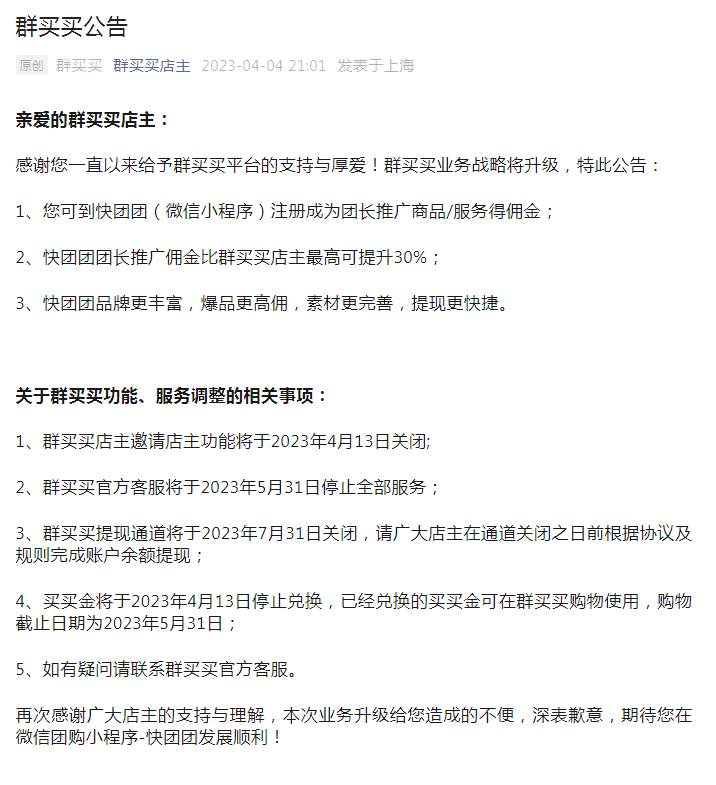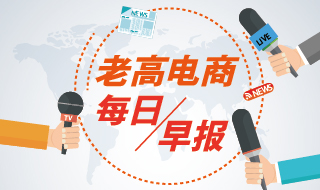Following Beidian, another e-commerce platform announced the closure.
The protagonist this time is group Maibu, a social e-commerce platform under Pinduoduo.
01. Strategic products that have been used to fight against Tmall
Recently, the group Mai Mai released an announcement stating that
As the business strategy will be upgraded, Qunmai Mai invites store owners, official customer service, reflect channels, and buy gold functions to stop services one after another. I hope the store owners can switch to Kuaituantuan.

This means that this social e-commerce platform, which has been launched against the trend in August 2020, officially announced that it has ended its e-commerce career after only two years of operation.
I remember that at that time , Qunmai Mai was a strategic product called against Tmall . It was born with a "golden spoon" and attracted many Taobao WeChat businessmen, distribution group leaders and mother entrepreneurs.
It was in the limelight for a while. Many store owners have won tens of millions or even over 100 million GMV on this popular platform.
But it comes quickly and goes quickly.
Although Pinduoduo put a lot of hope in group shopping, Pinduoduo did not provide continuous subsidies to it at that time, and with fewer SKUs, the overall performance of the platform was only a flash in the pan.
Until the second half of last year, the volume of group buying gradually decreased, and even no products were put on the shelves in some categories.

In the end, this "high-end version" Pinduoduo was pressed.
02. The reason for the decline
If Group Buy can achieve good results, Pinduoduo would not have abandoned it so quickly.
As a social platform that relies heavily on private domain attributes, Kequn Maimai has no long-term and stable business logic, and it is only a matter of time before it disappears into the wave of business.
The operation modes of Qumai Mai Mai are very similar to those of Haoyiku and Shipping Goods. They will have a good scale at the beginning of their development. After all, they can make money by attracting people. In addition to Pinduoduo's subsidies, they can start 0-1 very quickly.

But compared with other e-commerce platforms, Qunmai Mai Mai relies more on distributors, that is, distribution group leaders. This is actually the same as live e-commerce. Once there is a problem with the top anchor, the GMV of the entire platform will be affected to varying degrees.
Secondly, the core profit method of Qunmaimai platform is to rely on product commissions, unlike most traditional platforms that rely on advertising revenue. Therefore, the benefits of merchants advertising on group buying are not high. Most of the information sources obtained by consumers come from the private domain recommendations of group leaders, and the platform SKU will be limited.
Finally, the price. For the same product, group leaders or consumers will compare prices. Once they find that the prices on other platforms or Pinduoduo platforms are more favorable, then these consumers will be lost.
Unless the product has exclusive attributes, it is difficult for group buying and buying specialized in brand sales to make money and sell goods.
Furthermore, looking at the peer platforms such as Yunji, Beidian, and Zebra next door, the transaction scale of 200 billion to 30 billion may have reached the ceiling of the industry in a year.
From this perspective, this data is even less than that of Pinduoduo's channel.
In addition, Kuituantuantuan, a fellow disciple of Qunmai Mai, is in very healthy condition. Kuituantuantuan, which is both private domain scenarios, has more development prospects than Qunmai Mai Mai, with a low threshold and convenient operation, and has more long-term development potential.
In summary, for Pinduoduo, group buying does not have enough "sense of security". Anyone thinks such an uncontrollable business is a hot potato, so it is a foregone conclusion that the group buying is closed.
03. Social e-commerce is "destroying"
"Operation can be replicated, marketing can be replicated, supply chain can be replicated, and market can be replicated. Social e-commerce is too replicable and barriers cannot be established."
I believe this is the voice of many social e-commerce practitioners.
With the launch of WeChat Moments function in 2012, the social e-commerce model has also been born. With the help of the entry fee + three-level distribution model, it has opened up a path to obtain traffic.
After a few years of crazy growth, the industry ushered in a period of standardization. This traffic shortcut was blocked, and the problem of no core competition barriers was exposed. A large number of platforms and even platforms with "backers" were ordered to rectify or shut down and delist:
Global Catcher: In August 2017, the official account was banned due to rumor;
Yunji Weidian: In August 2017, he was fined 9.58 million yuan for rumor;
Taobao’s Taobao store: It is rumored in September 2021 and has been closed;
Dongxiaodian, a subsidiary of JD.com, was closed in January 2022 and moved to Fenxiang;
Xiaomi’s Youpin Youyu: Closed in March 2022;
Beidian, a subsidiary of Beibei Group, has been closed down in August 2021;
Maternal and infant social e-commerce Miya APP: closed in September 2022;
Yi.com: Founded in 2014, it switched to social e-commerce, and founder Jia Yong ran away with a tornado money;
Taojiji: Founded in August 2018 and went bankrupt in December 2019;
…
The reasons why these platforms rectify and leave are nothing more than safety and sustainability.
Just like group buying, there is no sufficient "capital fee" and "distribution system", and it is impossible to form a business model with core competitiveness and long-term development. It cannot constitute a virtuous cycle for win-win cooperation between platforms, consumers and merchants.
The essence of all this depends on the cost of acquiring and retaining customers.
For social e-commerce, this is an unsolved mystery of the past and may also be a difficult problem in the future.
Even so, there will still be endless social e-commerce companies in the future.
The story of social e-commerce is far from over!





![The "delayed shipment" rule sets a minimum compensation amount [Watcher interpretation]](/update/1487657352l131290921.jpg)



 EN
EN CN
CN
